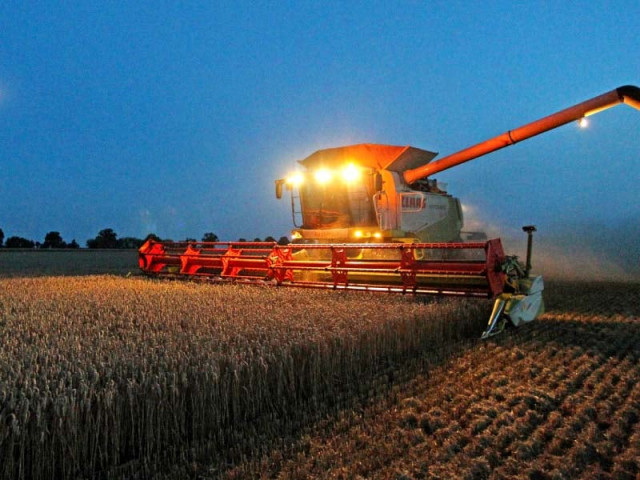Agreements signed to set up Pak-Uzbek Trade House
Countries aim to introduce technologically advanced agricultural equipment

Prime Minister Nawaz Sharif was impressed with the agricultural equipment when he visited Uzbekistan last time and had desired to introduce Uzbek farming technology in Pakistan. PHOTO: REUTERS
The agreement was signed on the sidelines of the visit of Uzbekistan Deputy Prime Minister Ulugbek Rozikulov, who along with Petroleum Minister Shahid Khaqan Abbasi witnessed the signing ceremony.
KASB Group Chairman Nasir Ali Shah Bukhari and Uzsanoatexport Board Chairman Erkinjon Yunusov inked the agreement.
The KASB Group has already introduced cotton-picking equipment and tractors from Uzbekistan. Uzbekistan is producing mechanised agriculture machinery, which is far better than the machinery produced in Pakistan, India and China. The cultivation through mechanised machinery doubles the yield.
The KASB Group initially intends to target the cotton and wheat cultivation areas. It will introduce the machinery in South Punjab and Upper Sindh - the hub of cotton production. The small tractors will be introduced in upper Punjab and Khyber-Pakhtunkhwa.
Due to the relatively high cost of these imported equipment, the KASB Group would initially give the machinery on lease to the farmers, said Nasir Bukhari. The KASB Group is setting up model farms to double the per acre yield in the country. The group will arrange countrywide exhibition of the imported machinery before cotton plantation season.
Despite an agrarian economy, Pakistan has been struggling to improve per acre yield. Still most of the work is done manually, which results into low production and high wastages. Uzbekistan is producing machinery with collaboration of Germany and France, ensuring better quality of goods.
The agriculture equipment is being imported from Uzbekistan by road through Afghanistan. However, bureaucratic attitude of the customs officials remain an obstacle in timely clearance of these imported goods at Torkham border. It takes about three weeks at Torkham border to get the consignment cleared.
The KASB Group is also introducing new technology-based tractors of 62HP and 100HP. Prime Minister Nawaz Sharif was impressed with the agricultural equipment when he visited Uzbekistan last time and had desired to introduce Uzbek farming technology in Pakistan.
Deputy Prime Minister of Uzbekistan met with Nawaz Sharif on Friday. The Prime Minister welcomed the concrete proposals from Uzbekistan for collaboration in the field of agricultural machinery, which are presently under consideration at the Ministry of Commerce and Ministry of National Food Security, according to the Prime Minister’s Office.
The prime minister emphasised that both countries need to make efforts to enhance cooperation in the economic and commercial fields and fully exploit the huge potential for mutual trade. The prime minister said that Uzbekistan’s impressive annual economic growth and rich energy resources, and Pakistan’s large industrial and agricultural base provide an ideal environment for expansion of trade and commercial cooperation between the two countries.
For the last five years, the economy of Uzbekistan is growing at an impressive pace of 8%, although in the first half of this year, it slipped slightly below 8% due to weakening demand of machinery and energy, according to Asian Development Bank. It is the fastest growing economy in Central Asia.
PM Sharif stressed the need to establish Pakistan-Uzbekistan Joint Business Council and revive the Joint Commission.
Uzbekistan is exporting large quantities of chemicals, electrical equipment, smart grid equipment, transmission lines, transformers, consumer electronics and mobile phone and building materials.
However, the bilateral trade volume is extremely low, standing at less than $30 million last year. Both the countries have expressed desire to expand the trade to $300 million in the medium term. Pakistan is importing cotton, yarn, clothes, iron, steel plastic, telecommunications equipment and electric items from Uzbekistan.
A memorandum of understanding for cooperation between the Apex chambers of both countries was also signed. A neighbour country is producing quality aircraft, cars and machinery which is not being imported, said FPCCI President Abdul Raul Alam.
Published in The Express Tribune, December 25th, 2016.
Like Business on Facebook, follow @TribuneBiz on Twitter to stay informed and join in the conversation.



















COMMENTS
Comments are moderated and generally will be posted if they are on-topic and not abusive.
For more information, please see our Comments FAQ